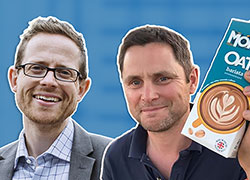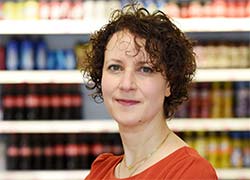Course overview
Science facilities in Bios
Check out our state-of-the-art facilities in Bios, with cutting-edge labs for science students in the School of Health & Life Sciences.
The BSc (Hons) Nutrition is a multi-disciplinary science encompassing biochemistry, physiology, food science, and behaviour.
You are highly employable in public health, nutrition research and consultancy, and the food industry. Graduates rapidly progress in their careers, with may having key roles in organisations that are household names: one led the local, and now regional response, to food poverty during the coronavirus crisis; two graduates were instrumental in the development of Quorn’s vegan range, work which began when they were still undergraduates.
On completion of this course you can apply for membership with the Institute of Food Science & Technology.
This course includes a foundation year - ideal if you need additional preparation or if you don't have sufficient grades to join Year 1 of a degree.
Top reasons to study this course:
- Evidence-based approach: use the latest evidence to learn how to support individuals to manage/prevent disease through the power of food and nutrition.
- Contemporary facilities: learn in our £36.9m cutting-edge BIOS building featuring state-of-the-art equipment and facilities, training you to become a food and nutrition professional.
- Experienced teaching team: benefit from their wealth of clinical experience. Learn from registered nutritionists and dietitians with a collective passion for nutrition, health and education.
- Make a difference: get involved in developing a range of sustainable and environmentally-friendly initiatives, including allotment management, seasonal cooking, food waste reduction, field visits, and healthy food banks.
Course details
Course structure
Foundation year core modules
What is big data? How is it made and how do we make sense of it? Discover how data is created, consider the ethical implications of using it and begin your journey accessing it. You explore its use in society and the role it plays in community relationships, from uncovering criminal networks and tracking disease outbreaks to developing a deeper understanding of our ecology. You understand how search engines collate and store the data needed to make predictions, enhance decision making, or to better understand society’s needs. You learn the impact big data has and the challenges it presents.
This is a 20-credit module.
Chemical Science and the Environment
Chemistry is the study of the structure, properties and reactivity of elements and compounds and plays a key role in physical, life and applied sciences. You are introduced to the fundamental concepts of the application of chemistry. You examine the structure of the atom, the periodic table, chemical bonding and chemical reactivity. Learn about environmental science, biogeochemistry, pollution, green chemistry and climate change.
This is a 20-credit module.
Experimental Methods for Life Science
Explore your academic interests in a practical setting, learning how to work safely and properly document your work. If you’re interested in biology, you investigate the basics of microscopy and the handling of microorganisms. If your preference is food sciences, you begin to look at the safe handling of food. And if you’re interested in chemistry, you begin to use volumetric glassware and investigate acid-base titrations.
This is a 20-credit module.
Team up with your coursemates to find out how science can help address some of the biggest issues facing society today. You explore health and wellbeing, resilient and secure societies, digital and creative economy, sustainable environments, and learning for the 21st century.
This is a 20-credit module.
You explore the diversity of life on earth and the concept of evolution. You discuss Darwin’s theory to demonstrate relationships between species, the principles of taxonomy and speciation, and how they relate to the evolutionary tree.
Physiological processes, cellular organisation, homeostasis, metabolism, growth, reproduction, response to stimuli and adaptation - these are the hallmarks of living organisms and equip diverse species to survive and thrive. You complete an in-depth analysis of a number of organisms to examine and compare the strategies they use to thrive and appreciate how evolution has led to divergent life forms. You normally take part in a field visit to a local site to examine biodiversity and the natural world.
This is a 20-credit module.
You focus on life sciences from a human perspective, while developing an understanding of human biology to explore the role of different but interconnected life science disciplines in modern life. You consider the major human body systems (cardiovascular, respiratory, excretory, endocrine, nervous, digestive, skeletal and reproductive) to appreciate how this knowledge is relevant to issues in health, disease and modern society.
This is a 20-credit module.
Year 1 core modules
Gain basic knowledge of human anatomy and an understanding of the mechanisms associated with control and regulation of the physiological processes of the major organ system. Homeostasis is the key theme throughout the module, as you explore interrelationships between human functions and the organisational hierarchy to develop and increase your understanding of how the body functions. You also study the construction of biological profiles for human identification including sex, age at death, stature determination and biological affinity. This knowledge is used in the context of identification and recovery of human remains, the regulatory aspect of handing human remains and ethical issues related to human tissue research.
This is a 20-credit module.
Biochemistry and Chemical Science
Study the key principles of biochemistry, including the structure of the atom, chemical bonding and the forces that operate between molecules, chemical reactions and biological pathways. Investigate the chemistry of carbon and why this element is capable of forming the complex three-dimensional molecules that make life possible. Crucial groups of biological molecules are studied in detail, including proteins, carbohydrates, lipids, and nucleic acids.
This is a 20-credit module.
At a cellular level, you develop your understanding of biological processes. You explore the common features and immense diversity of form and function displayed by cells of organisms. You examine eukaryotic cell architecture and function with a molecular and mammalian focus and learn about cell division, the cell cycle, genetic organisation of cells, DNA replication and gene expression.
This is a 20-credit module.
Develop your understanding of the issues surrounding food, nutrition and human physiology. You are introduced to the fundamental concepts that underpin modern food science and nutrition, including a review of the composition of food in terms of macronutrients and micronutrients.
Explore the concept of critical analysis and evidence-based research in nutrition and health. Dietary intake and analysis are examined along with identifying ways of providing dietary guidance to change behaviour in positive ways.
This is a 20-credit module.
Examine major food commodities from technical, agricultural, sustainability and food industry perspectives. Explore the food supply chain and the structure and organisation of food production including meat, fish, cereal, fruit, vegetable and dairy. Develop an understanding of the main food commodities, research processes and the application of qualitative and quantitative research methods in the public perception of sustainable strategies.
This is a 20-credit module.
You develop an understanding of nutrition and health in key areas including the role of nutrition in diet health and disease, the potential of food and medicine, and the importance of the gut biome to health. Nutrition as a science is emphasised in topics including nutrition and food science, dietetics and the potential impact of nutrition on learning. Expand your professional skills in areas including developing and implementing public policy in health and nutrition, how policy is developed from evidence and the role of public health guidelines. These skills support subsequent applications for professional status in nutrition. You also develop key skills in researching academic literature and using that information to develop your own understanding. Key national and international datasets support your understanding of the research process including the application of both qualitative and quantitative research methods, the use of statistics in nutrition, and public perception and trust in nutritional research.
This is a 20-credit module.
Year 2 core modules
Food Manufacturing and Processing
Working in a group, create your own food factory, taking food production from the bench top through to a full-scale automated manufacturing process. Examine and analyse the methods and strategies used in the design and processing of food including the use of design software. Issues such as health, safety, environment and ethics facing the food technologist in the workplace are explored. Through the factory design activity you develop employability skills such as project management, presentation and teamwork skills, and research and commercial awareness to support problem solving in a working environment.
This is a 20-credit module.
Food Perception and Product Design
Explore a range of factors that influence food consumer choices. Providing an in-depth understanding of the food product development process, you are introduced to market analysis, sensory evaluation and other methods used to assess the properties of food such as taste, flavour and texture. Understand how to evaluate different perspectives and information regarding the market for new and existing food products and the influences on consumer behaviour.
This is a 20-credit module.
Identify a range of food-related safety issues, review current hygiene practices in the industry and explore the implementation of appropriate processes and procedures to effect the safe processing of foods. Factors which affect food safety including food-borne pathogens, chemical safety and foreign object contamination are examined and the microorganisms causing food-borne disease and food spoilage are discussed. You are also introduced to food safety management including an introduction to hazard analysis critical control points.
This is a 20-credit module.
Examine the chemistry and composition of foods and develop your understanding of the effect of food processing on the nutritional value of the food we eat. Get practical experience of analytical techniques commonly applied to raw materials and food products and learn about systems for improving the traceability and authenticity of food supply chains. Data analysis and research skills are developed using statistical tools.
This is a 20-credit module.
Human Metabolism and Clinical Biochemistry
Gain an understanding of the human metabolism, endocrinology and clinical biochemistry. Examine metabolism, the chemical processes that occurs in living organisms, in the context of carbohydrate and lipid metabolism, cellular respiration and metabolism of drugs. Discuss endocrinology and review the mechanisms underpinning hormone action, the roles of second messengers and endocrine system disorders. Enzyme kinetics and enzyme regulation is a significant topic. Explore the methods used for collecting, measuring and analysing clinical samples in the biomedical lab. Learn the principles and applications of clinical biochemistry investigations used in screening, diagnosing, treating and monitoring disease.
This is a 20-credit module.
Social, environmental and economic factors influence an individual’s health and wellbeing. A healthy diet, education, income, smoking and alcohol abuse are all considerations. You examine these positive and negative influences.
An evidence-based approach helps you to understand key developmental issues in the various stages of life, from preconception and adolescence through to old age. You develop effective research skills and learn how to critically evaluate existing information and theories, using what you have learnt to deliver solutions for key public health issues
This is a 20-credit module.
Optional work placement year
You have the option to spend one year in industry learning and developing your skills. We encourage and support you with applying for a placement, job hunting and networking.
You gain experience favoured by graduate recruiters and develop your technical skillset. You also obtain the transferable skills required in any professional environment, including communication, negotiation, teamwork, leadership, organisation, confidence, self-reliance, problem-solving, being able to work under pressure, and commercial awareness.
Many employers view a placement as a year-long interview, therefore placements are increasingly becoming an essential part of an organisation's pre-selection strategy in their graduate recruitment process. Benefits include:
· improved job prospects
· enhanced employment skills and improved career progression opportunities
· a higher starting salary than your full-time counterparts
· a better degree classification
· a richer CV
· a year's salary before completing your degree
· experience of workplace culture
· the opportunity to design and base your final-year project within a working environment.
If you are unable to secure a work placement with an employer, then you simply continue on a course without the work placement.
Final-year core modules
Advanced Food Science and Nutrition
Focus on the quality of the evidence and research behind diet and disease relationships. You explore the relationship between nutrition, physical activity and health. You also contemplate the role of diet in the treatment of disease, and the identification and impact of dietary deficiencies on health and behaviour.
This is a 20-credit module.
Clinical Nutrition and Dietetics
A range of concepts and practical issues associated with the role of diet as a therapeutic measure in various diseases are examined. Strong emphasis is placed on the relationship between clinical data and the nutritional management of patients. Methods of nutritional assessment and diet planning are investigated, and the principles of nutritional intervention for eating disorders reviewed.
This is a 20-credit module.
Understand how to successfully run a new product development cycle in this module. Develop a new food product aimed at a market that requires a specific nutritional profile in their diet, such as diabetics. Explore the stages required to launch a new food product, from conception through to product launch, and evaluate the product through sensory and non-sensory techniques.
This is a 20-credit module.
You complete an in-depth, independent investigation into a specialist aspect of your field of study. You bring together a range of practical and academic skills developed in previous study, including analysing and critically evaluating data and a critical reflection on the potential risks, and moral and ethical issues. You are supported by a research supervisor who helps you develop and complete your research project.
This is a 40-credit module.
Sports Nutrition and Physiology
You gain an indepth understanding of the nutritional and metabolic demands of exercise and the interactions between diet, exercise and health. You develop practical experience of how nutrition influences sports performance and understand how training in sport and exercise nutrition equips you for future careers in research, health or applied sports nutrition support. You critically analyse current dietary practices and dietary recommendations, and apply your theoretical and practical skills to a real-life scenario with an athlete to further optimise their performance.
This is a 20-credit module.
Modules offered may vary.
How you learn
You learn through a range of teaching and learning methods including:
- lectures
- tutorials
- seminars and workshops (including oral presentations and poster sessions)
- laboratory work
- computer laboratory-based sessions
- group projects
- research projects.
Each programme and module is supported by a specific virtual learning environment (VLE) site.
Our Disability Services team provide an inclusive and empowering learning environment and have specialist staff to support disabled students access any additional tailored resources needed. If you have a specific learning difficulty, mental health condition, autism, sensory impairment, chronic health condition or any other disability please contact a Disability Services as early as possible.
Find out more about our disability services
Find out more about financial support
Find out more about our course related costs
Entry requirements
Entry requirements
Any Level 3 subject is acceptable for entry to this course.
Normally entry qualifications can be accumulated from:
• any combination of Level 3 qualifications (for example, A/AS levels, BTEC Certificates/Diplomas, Access to Higher Education courses)
• High School Certificate or Diploma with good grades completed after at least 12 years of primary and secondary education
English language and mathematics requirements
Normally, evidence of English language and mathematical skills equivalent to at least GCSE grade 4 is required. We consider a wide range of English and maths qualifications alternative to GCSEs. Please contact our admissions staff for advice.
Non-EU international students who need a student visa to study in the UK should check our web pages on UKVI-compliant English language requirements. The University also provides pre-sessional English language courses if you do not meet the minimum English language requirement.
Applicant Days
If you receive an offer to study with us you may be invited to attend one of our Applicant Days. This is a great opportunity to learn more about studying at Teesside by exploring our campus, seeing our excellent facilities, meeting staff and students, and finding out more about your course.
The Applicant Day provides you with information, guidance and advice to help you make the right choice. Even if you have attended an Open Day we encourage you to attend the Applicant Day - we are confident you will find your visit a useful experience.
Alternative progression routes
If you are not eligible to join this course directly then we may be able to help you prepare for admission by studying appropriate pre-degree Summer University modules.
Please contact us to discuss the alternative progression routes available to you.
For general information please see our overview of entry requirements.
Are you an international student looking for a foundation course offering both academic and English language content? Explore your options with our International Study Centre.
International applicants can find out what qualifications they need by visiting Your Country.
You can gain considerable knowledge from work, volunteering and life. Under recognition of prior learning (RPL) you may be awarded credit for this which can be credited towards the course you want to study.
Find out more about RPL
Employability
Career opportunities
You benefit from gain broad scientific knowledge and skills giving you opportunities for a career in the NHS, food industry, public health, government, local authorities, nutrition research institutions, consultancy firms, charitable organisations and non-governmental organisations (NGOs).
The food industry is the biggest employer in the UK, and one of the biggest recruiters of science graduates. Teesside graduates have secured management roles in food companies which are leading-edge and household names, including Quorn Foods, Glanbia Performance Nutrition, Huel, Kerry Ingredients, Ornua Nutrition Ingredients, Science in Sport, and Robert Linley Ltd.
Ambitious to set up your own business? We can support you on our student entrepreneurship programmes.
Typical careers include:
- Product development manager – play a crucial role in developing and managing the creation of new products, from initial concept right through to product launch, combining technical knowledge, research and consumer understanding.
- Nutritionist – support people to make positive dietary changes by offering evidence-based advice and guidance tailored to specific groups, including those with intolerances, individuals looking to lose/gain weight, athletes and new mothers.
- Dietician – diagnose and treat people with nutrition problems, supporting overall health and nutrition through practical and tailored dietary advice, working within hospitals or community settings.
- Scientific research – generate new knowledge and contribute to innovation in a role which involves securing funding, conducting experiments and analysing results.
- Laboratory scientist – prepare samples, conduct analytical tests and experiments, maintain lab equipment and record and analyse data for roles in research, development, quality control or production across fields like biotechnology or pharmaceutics.
- Management and senior administration – oversee the operations of facilities, ensuring quality, managing budgets, coordinating staff and implementing policies.
- Teaching – pass on skills and knowledge in food and nutrition onto the next generation. Becoming a teacher also requires a PGCE and Qualified Teacher Status (both available at Teesside).
- NGOs – work for a non-profit entity to create positive change by providing services, advocacy, and resources, often focusing on vulnerable communities.
Postgraduate study: graduates may seek further postgraduate study in advanced health-related subjects, with courses offered by Teesside University found here. Graduates of this course with a 2.1 honours degree will be guaranteed an interview for MSc Dietetics (Pre-Registration).
Information for international applicants
Qualifications
International applicants - find out what qualifications you need by selecting your country below.
Select your country:
Useful information
Visit our international pages for useful information for non-UK students and applicants.

 BSc (Hons) Food and Nutrition*
BSc (Hons) Food and Nutrition* BSc (Hons) Food and Nutrition*
BSc (Hons) Food and Nutrition* BSc (Hons) Food and Nutrition
BSc (Hons) Food and Nutrition Teesside University launches bid to further expand health, medical and clinical provision
Teesside University launches bid to further expand health, medical and clinical provision Helping develop sustainable dairy alternatives
Helping develop sustainable dairy alternatives Energy drinks ban to under 16s welcomed but more must be done
Energy drinks ban to under 16s welcomed but more must be done